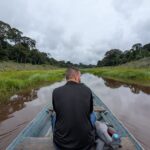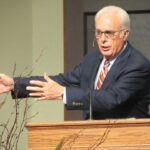Blog Post
A lesson on how to treat God’s creatures from a World War II Medal of Honor recipient
By Jonathon Van Maren
One of the things I enjoy the most about being able to interview people for The Bridgehead every month is the fascinating stories, insights, and perspectives I get to hear. Sometimes, those perspectives catch me off-guard—like the perspective of Hershel “Woody” Williams, who is one of only three surviving Medal of Honor recipients from the Second World War. I had planned to do a show on the virtue of courage, but Williams ended up also emphasizing a few important lessons about man’s relationship with the Creation around him that I think are also important and worth considering. But first, the story.
On February 21, 1945, Williams landed on the steel-swept beach of Iwo Jima with the 1st Battalion, 21st Marines. Two days later, Williams became a legend when he hefted a seventy-pound flamethrower and headed out alone, covered only by a handful of riflemen, to clear a series of concrete pillboxes under unrelenting machine gun fire and counter-attacks by Japanese soldiers, who soon became desperate to kill the young West Virginia farm boy. Williams—who told me that he has no actual memory of this—came back to the American lines over and over again to fetch new flamethrowers and explosives, and then headed back out to clear the way for his comrades. He was charged by Japanese soldiers and was forced to immolate them with his flamethrower—at one point, he crept up to a hidden bunker, and thrust the nozzle of his flamethrower inside, killing those within almost instantly.
Williams saw the famous flag-raising over Iwo Jima, and fought on through the more than month-long battle on the island despite shrapnel embedded in his leg. He remembers vividly, he told me, what Harry Truman said to him when the president hung the Medal of Honor around his neck on October 5, 1945 for his courage on Iwo Jima: “I’d rather have this medal than to be president.”
That day, as I’m sure you can imagine, was only the beginning of Williams’ journey. Like so many others, he faced post-combat stress disorder—nightmares and flashbacks haunted him. So did the smell of burning human flesh—an odor, he says, like no other. But there was something different about the source of Williams’ struggles. For him, it was because he was raised to believe that killing was wrong—and because, in his words, he had to “eliminate so many individuals”—he still rarely uses the word “kill”—he was sure God couldn’t forgive him, and he could not forgive himself.
“I was born and raised in a family that was strict—not mean, or anything like that—but strict,” he told me. “We were certainly taught that you did not kill anything of any nature except to kill something for food, or to kill something that had injured itself to where it had to be put out of its misery—a dog would break a leg, or a horse would get down to where it couldn’t get up—then you would have to use the extreme to eliminate the misery by eliminating the animal. But that was very strictly enforced…We had slingshots, and we used inner tubes for our bands on it and we got pretty good with it—I would classify myself almost as an expert, because I shot that thing a lot. And a couple of times, in my pre-teen years…I got caught killing a bird. It was just something to shoot at, so I shot at it and hit it and killed it and got caught and got a whipping. You don’t do that. That bird didn’t do anything to you, so you had no reason in the world to kill that bird, so you gotta pay the price for it. That’s the way I was taught.”
To go from that perspective—that killing was only permissible for eating and to put animals out of their misery—to the brutality of the war in the Pacific, where Williams wielded his flamethrower against other men—was simply too difficult. It was not until 1962, Williams says, that a pastor finally broke through to him and he began to understand that there was nothing God could not forgive.
That part of my interview with Williams especially fascinated me simply because it seems that so many great men have also had an enormous concern for God’s creatures. Abraham Lincoln once said that, “I care not much for a man’s religion whose dog and cat are not the better for it.” William Wilberforce, who changed Western civilization as we know it and was instrumental in the abolishing of the slave trade and slavery itself throughout the British Empire, also started one of the first animal welfare societies and constantly attacked “sporting” events like bear-baiting as wicked and cruel. Famously, he once demanded that his carriage be stopped so that he could stop another driver from beating his horse.
As I noted in a column last week, many of those who feel for God’s creation do so because they see this creation from a Christian perspective, and from that perspective, animals only suffer because of the sinfulness of mankind. My dad often tells the story of his grandmother (my great-grandmother) back in the Netherlands. One of her children saw her crying as she sat in her chair, and asked her why. Well, my great-grandmother replied, the goat was sick—and she could not help but think that animals would not experience such misery if it was not for the sinfulness of human beings like herself.
I didn’t expect, when I called a World War II veteran to hear his story of courage, to get a reminder of how we are called by God to treat all of his creatures. I’m glad I did. Williams’ story—and his perspective—are powerful in more ways than one.
_____________________________________________
For anyone interested, my book on The Culture War, which analyzes the journey our culture has taken from the way it was to the way it is and examines the Sexual Revolution, hook-up culture, the rise of the porn plague, abortion, commodity culture, euthanasia, and the gay rights movement, is available for sale here.








